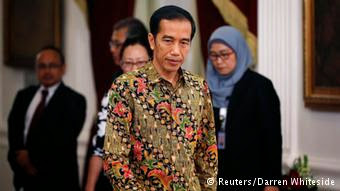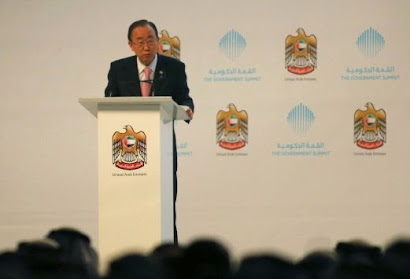
Wito, in his kiosk, was the driving force in turning a sidewalk near Pasar Baru into a tourist attraction and artistic hub. (JG Photos/Ade Mardiyati)
A world away from the marble-tiled galleries where classical music plays solemnly in the background, this dusty corner of Central Jakarta is home to portrait artists who eke out a living from their craft.
But what the line of kiosks lacks in high-brow ambience, it more than makes up for in talent and heart.
Located just across the street from the Pasar Baru shopping complex, on Jalan Kesenian, the “gallery” stretches the entire length of a tree-lined and shady sidewalk.
In the early 1980s, long before Jakartans became obsessed with Facebook and e-vites, a handful of skilled artisans earned their living creating greeting cards on the side of the river near the Pasar Baru gate.
“But then, in the early 1990s, people started to lose their passion for sending greeting cards as technology became more readily available,” says Wito, a 43-year-old portrait artist, who also heads the area’s Kelompok Pelukis dan Penulis Indah (Painters and Calligraphers Group).
“The place then turned into an area for artists who did portraits and caricatures.”
Wito says that in 1999, the local administration “cleaned up” their old location, relocating the artists to the area they now occupy. Wito and his colleagues were not happy about the move.
“They gave us big umbrellas and we worked and displayed our stuff underneath them,” Wito says. “You can imagine how hard it was for us, especially when it rained. So I decided to call all the artists here together to construct semi-permanent kiosks. And we did it, without asking permission from local officials.
“I didn’t really care about the risk. To get a permit, you would have to go through all the bureaucracy. I thought we could deal with it later.”
Thanks to Wito’s enthusiasm, the area, which consists of 29 kiosks — some housing more than one artist — received official recognition in 2007. It is now one of Jakarta’s tourist attractions.
“Anything related to our existence here, or when we are invited to exhibit our work, is discussed during our meetings,” Wito said.
An array of portraits and caricatures of famous people — from actress Ayu Azhari to former anticorruption czar Antasari Azhar — rendered in pencil and paint on paper and canvas, are on display at the kiosks. US President Barack Obama seems to be a favorite, with his image available at almost every kiosk.
These street artists may occupy spots approximately the size of a walk-in closet, but they manage to attract countless clients, from everyday tourists to CEOs of companies. Their works of art, depending on the size and material used, sell for anywhere from Rp 100,000 to Rp 5 million ($11 to $535).
Inside Wito’s bale lukis , or painting hall, beautiful portraits adorn the plank walls, including one of Tien Suharto, the wife of former President Suharto, which the artist did when Suharto was still in power. Wito says that a few years ago, one of the strongman’s grandchildren asked if they could buy the portrait. Wito asked for Rp 15 million, but the potential buyer never came back.
The artist also has a portrait of President Susilo Bambang Yudhoyono. “I painted that before he became president,” Wito says. “Besides that one, I did another one of him that was ordered by his son Agus and actress Anisa Pohan before they were married. It was for Pak SBY’s birthday. They were very nice people. I was even invited to the wedding.
“What made me feel special was knowing that I was still included on the guest list, which was cut down from 5,000 to just 2,000,” he adds.
Meshadi, another street artist, still remembers delivering the portrait of Finance Minister Sri Mulyani Indrawati to her office. “I didn’t meet her in person,” the 40-year-old says. “I think it was her assistant who met with me.”
Meshadi sits on a plastic chair inside his kiosk, his left hand holding a photo of a man, while his right hand busily flits across the canvas. Meshadi likes to talk as he works.
“Clients will sometimes tell me that they want to look more beautiful or thinner in their portraits,” he says with a smile. “It’s a normal request. And I’m happy to do it.”
Meshadi and Wito, like some of the other artists in the area, used to work 9-to-5 jobs. In the end, though, they simply felt like they did not belong there. “I lied quite a lot, calling in sick when I started to get tired of my job” Meshadi says.
He spent three years at a shipping company before deciding to capitalize on his artistic talent and strike out on his own.
“I’m very happy with what I do for a living now and I’m glad that I made the decision to quit working [at the shipping company],” the father of four says.
Wito says, “When I was still working for someone, my boss had the same schedule as me and I just felt it wasn’t right. With this job, I have the freedom to decide whether I want to go to my ‘office’ or just stay at home. And I don’t have to feel guilty.”
Meshadi says he doesn’t know exactly how many clients he has each month, but that he has enough to make a living.
Jakarta Governor Fauzi Bowo is a former client who bought one of Meshadi’s paintings during a 2008 exhibition for street artists. “The governor chose the painting I did out of all the paintings of him that were on exhibit,” the artist says. “It was a picture of him wearing his uniform, sitting in his office.”
While Meshadi and Wito both consciously made the decision to become self-employed, Didit Kadito was a victim of the massive layoffs in 1998. “I had been working as a full-time illustrator for a tabloid, did freelance work for Majalah Kartini [a well-known magazine for women] and illustrated books of folktales,” the grandfather recounts.
He was eventually able to adjust to the change and now enjoys what he does.
“This area may look a bit quiet, but thank God people are always coming,” he says, adding that his client base is comprised mostly of foreign tourists looking for depictions of Indonesian culture and employees looking for a gift to give their expatriate bosses who are returning home.
Didit says that he has a minimum of 15 to 20 orders in a month.
“I’m not disclosing how much I charge because every one here most probably charges differently,” he says, when asked about the going rate for his paintings.
He adds that all of the artists have their own trademark style, which makes one different from the next. This, he says, is the reason for the differences in how their portraits are priced.
“Like me, I am known for doing caricatures with distortions, like those in Time magazine. Other people have their own unique selling points, too.”
Wito says he tries to maintain a good relationship with the local officials in the area and tourists by keeping the area clear of traffic and free of trash and street vendors.
“Since they have let us stay here, let’s give something back,” he says. “This is one of the city’s tourism areas so we should try to maintain it.”
Artist contact information:
Wito, Kiosk No. 13, Tel: 0815 977 2209, 021 4288 1870
Meshadi, Kiosk No. 25, Tel: 0812 840 7829
Didit Kadito, Kiosk No. 11, Tel: 0815 828 8954






No comments:
Post a Comment